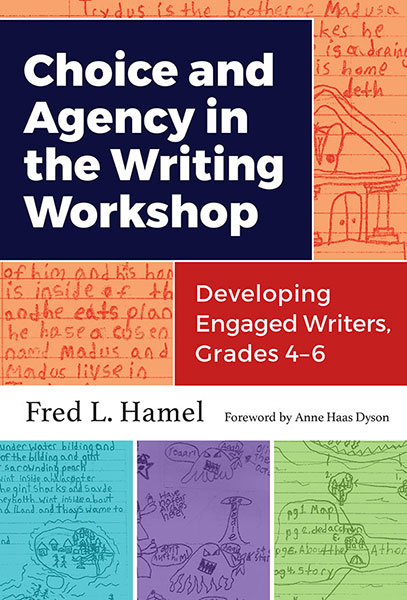Professors: Request an Exam Copy
Print copies available for US orders only. For orders outside the US, see our international distributors.
Foreword by: Anne Haas Dyson
Publication Date: March 24, 2017
Pages: 168
Series: Language and Literacy Series

Step into a classroom and “listen in” on the writing initiatives and motivations of students who are given significant choice and agency in the development of their writing. Discover why upper elementary children need ways to become literate as kids, not merely as prototypes of adults or teenagers. Filled with rich portraits of in-class writing interactions and challenges, this book highlights various themes that help teachers become better observers and more responsive to the complexity of writing in children’s lives. Key themes include drawing and popular media in children’s learning, the challenges of listening to students during conferences, the intersections of writing and relationships, the roles of sharing and publishing writing, and the importance of shaping a writing curriculum through dialogue.
Book Features:
Fred L. Hamel is a professor in the School of Education at the University of Puget Sound, Tacoma, Washington.
"There is much to learn from Hamel in terms of his thoughtful pedagogical decision making, his keen sense of observation, and his delight in children as writers, thinkers, and people. All teachers, not simply those who are already believers of the importance of valuing children’s participation in official and unofficial worlds (e.g., Dyson, 2003), would benefit from his view into this classroom world of children writing."
—Teachers College Record
"With Choice and Agency in the Writing Workshop: Developing Engaged Writers, grades 4-6, Fred L. Hamel invites readers to observe a writing workshop in action, think deeply about writing workshop, and imagine how they can respond to student writers in generative ways. In addition to sharing about what works in this kind of instruction, Hamel also explores tensions that educators might experience within a workshop context."
—Journal of Language and Literacy Education
"Fred Hamel not only offers us readers insight into the text-mediated dramas of children’s lives, he allows us into the sort of pedagogical reflections that keep us all in the flow of becoming."
—From the Foreword by Anne Haas Dyson, University of Illinois
"This timely book is about the experimentation, flexibility, vulnerabilities, and risks of educators when they don’t assume to always know what is best for writers. Through classroom examples, Hamel helps us to see the complex and entangled identities of teachers and students. This book asks us all to consider putting less emphasis on expected writing endpoints and think more about the social processes and relationships of literacies coming to be."
—Candace R. Kuby, University of Missouri and author of Go Be a Writer! Expanding the Curricular Boundaries of Literacy Learning with Children
Table of Contents
Foreword by Anne Haas Dyson
Acknowledgments
Introduction
The Origins of a Writers' Workshop with Upper Elementary Students
The Goals of This Book
Audience and Chapter Overview
Chapter 1. Initiating a New Writing Environment: Perspective and Practice
Day One
Theoretical Foundations
Our Writers' Workshop Approach
Context: Reflecting on Race and Class
Keeping Alive a Listening Stance with Upper Elementary Students
Chapter 2. Writing as Visualizing Popular Worlds
Martin: Screen Shots and Video Games
Carla: Author-Artist in Community
Ricky: Learning to Write as Play
Concluding Thoughts
Questions for Reflection
Chapter 3: Conferencing and Literacy Desiring: Trusting Students as Writers
Learning to Latch on to Students' Goals
Responding to Confusing Writing: Macie's Story
Respecting the Present Moment
Questions for Reflection
Chapter 4. How Relationships Influence Writing and Writing Influences Relationships
Building Social Connections Through Writing
Navigating Voice, Control, and Status
Embracing the Social (Writing) Curriculum
Questions for Reflection
Chapter 5. Sharing and Publishing: Being Seen, Heard, and Valued
The Lure of Publishing
Negotiating Public Spaces
Shaping Community Membership
Setting New Conditions for Language Development
Questions for Reflection
Chapter 6. Shaping the Writing Curriculum Together
Revisiting Plot: Talking About Lines and Mountains
Navigating Controversial Content
Forming Purposes in Community
Questions for Reflection
Chapter 7. Developing Children as Writers
Becoming Literate as Kids
Implications for Practitioners
Closing Thoughts
Afterword with Sam Allegro
Notes
References
Index
About the Author
Professors: Request an Exam Copy
Print copies available for US orders only. For orders outside the US, see our international distributors.